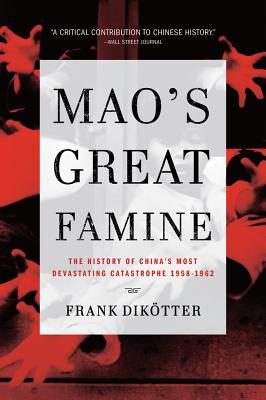

 Walker & Company
Walker & Company
Mao's Great Famine: The History of China's Most Devastating Catastrophe, 1958-1962


Key Metrics
- Frank Dikotter
- Walker & Company
- Paperback
- 9780802779236
- 8.2 X 5.5 X 1.4 inches
- 0.95 pounds
- History > Asia - China
- English
 Secure Transaction
Secure TransactionBook Description
Winner of the Samuel Johnson Prize
An unprecedented, groundbreaking history of China's Great Famine that recasts the era of Mao Zedong and the history of the People's Republic of China.
Between 1958 and 1962, China descended into hell. Mao Zedong threw his country into a frenzy with the Great Leap Forward, an attempt to catch up to and overtake Britain in less than fifteen years. The experiment ended in the greatest catastrophe the country had ever known, destroying tens of millions of lives.
So opens Frank Dik�tter's riveting, magnificently detailed chronicle of an era in Chinese history much speculated about but never before fully documented, as access to Communist Party archives has long been restricted to all but the most trusted historians. A new archive law has opened up thousands of central and provincial documents that fundamentally change the way one can study the Maoist era.
Dik�tter makes clear, as nobody has before, that far from being the program that would lift the country among the world's superpowers and prove the power of Communism, as Mao imagined, the Great Leap Forward transformed the country in the other direction. It became the site not only of one of the most deadly mass killings of human history--at least forty-five million people were worked, starved, or beaten to death--but also of the greatest demolition of real estate in human history, as up to one-third of all housing was turned into rubble. The experiment was a catastrophe for the natural world as well, as the land was savaged in the maniacal pursuit of steel and other industrial accomplishments. In a powerful meshing of exhaustive research in Chinese archives and narrative drive, Dik�tter, for the first time, links up what happened in the corridors of power--the vicious backstabbing and bullying tactics that took place among party leaders--with the everyday experiences of ordinary people, giving voice to the dead and disenfranchised. His magisterial account recasts the history of the People's Republic of China.
Author Bio
Frank Dikötter is the author of the People's Trilogy, a series of books that document the impact of communism on the lives of ordinary people in China on the basis of new archival material. The first volume, entitled Mao's Great Famine: The History of China's Most Devastating Catastrophe, won the 2011 Samuel Johnson Prize for Non-Fiction, Britain's most prestigious book award for non-fiction.
The second instalment, The Tragedy of Liberation: A History of the Chinese Revolution, 1945-1957, was short-listed for the Orwell Prize in 2014. The Cultural Revolution: A People’s History, 1962-1976 concludes the trilogy and was short-listed for the PEN Hessell-Tiltman Prize in 2017. His last book is entitled How to be a Dictator.
Frank has been Chair Professor of Humanities at the University of Hong Kong since 2006. Before coming to Hong Kong he was Professor of the Modern History of China at the School of Oriental and African Studies, University of London.
Born in the Netherlands in 1961, he was educated in Switzerland and graduated from the University of Geneva with a Double Major in History and Russian. After two years in the People's Republic of China, he moved to London where he obtained his PhD in History from the School of Oriental and African Studies (SOAS) in 1990.
He stayed at SOAS as British Academy Postdoctoral Fellow and as Wellcome Research Fellow before being promoted to a personal chair as Professor of the Modern History of China in 2002. His research and writing has been funded by over 2 US$ million in grants from various foundations, including, in Britain, the Wellcome Trust, the Arts and Humanities Research Council, The Economic and Social Research Council and, in Hong Kong, the Research Grants Council and the Chiang Ching-kuo Foundation.
He holds an honorary doctorate from Leiden University and is a senior fellow at the Hoover Institution.
He has published a dozen books that have changed the ways historians view modern China, from the classic The Discourse of Race in Modern China (1992) to China before Mao: The Age of Openness (2007). Frank Dikötter is married and lives in Hong Kong.
Source: www.frankdikotter.com
Videos
No Videos
Community reviews
Write a ReviewNo Community reviews